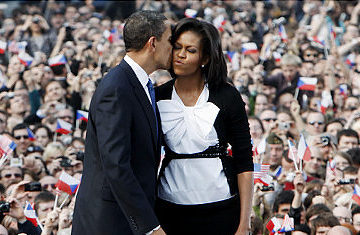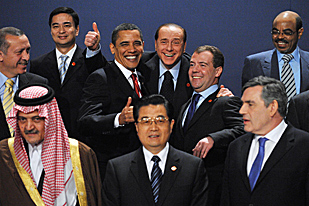
Above: President Obama delivers a kiss to First Lady Michelle
Obama before making a speech in Prague on Sunday.
( Monsivais/AP)
New York Daily News
By Mike Lupica
Monday, April 6th 2009
DETROIT – This is the country we all want Barack Obama to fix now, on E. Jefferson in Detroit, a city that has been hit as hard as any we have…It is also this: Once again being a President we can send out to the world without embarrassment, or fear. That is why this past week mattered so much in Europe. Having him be the face and voice of this country mattered, last week and next week and for a long time, as he restores this country’s good name the way he tries to restore its confidence. Read more.
From File: The Obama Presidency & Ethiopia

President Barack Obama (center) and Prime Minister
Meles Zenawi (top right) at the Group of 20 summit
meeting in London.
Tadias Magazine
Time for Fresh Thought
By Donald N. Levine
Published: Monday, March 23, 2009
New York (Tadias) – Throughout 2008 I published articles on links between Ethiopia’s needs and the promises of an Obama presidency. Now that President Obama is in office, what might we project? What, that is, might it mean to reconsider U.S. relations with Ethiopia in ways that align them with the orientations of an Obama presidency?
Eyeing policies the Obama administration has already implemented and earlier statements suggests at least half a dozen aims: 1) employ state-of-the art technologies to advance human welfare; 2) develop energy sources to replace fossil fuels, and in other ways conserve natural environments; 3) link upgraded education and health services with a strengthened economy; 4) avoid sharp polarities of pronouncement and of conduct; 5) curtail terrorist tactics, but in smart ways; and 6) restore moral direction for a market economy and public service from the citizenry. In what follows I explore implications of those principles and priorities for U.S. relations with Ethiopia.
Leapfrogging over industrial society technologies
America’s vast aid program to Ethiopia encompasses commitments of a billion dollars in FY 2008. This assistance goes to about a dozen areas: food aid linked to rural works ($301.6 million); agricultural
development ($4.6m); maternal-child and reproductive health ($31.6m); malaria control ($20m); water and sanitation ($2.3); basic education ($15m); democratic capacity-building in legislative, judicial, and civil society branches ($2.7m); security sector reform ($1.5m); trade and enterprise expansion ($6.3m); ecotourism and habitat protection ($1.5m); programs to combat HIV/AIDS ($349m); and humanitarian emergency assistance, including early warning systems ($291.5m).
Management of this program constitutes a daunting challenge that has been met by a devoted crew of American aid professionals. They have accomplished an enormous amount in many areas, work that rarely gets the kind of recognition in Ethiopia or in the United States it deserves. Even so, much of their mission remains defined in terms of conventional visions and methods.
It is a truism in development thinking that Latecomers have special advantages over Earlybirds, in that they have an opportunity to bypass errors and traumas of the countries that modernized first and to exploit ideas and inventions not available when the latter transformed. One need not be Trotsky to appreciate the insights contained in his Law of Uneven and Combined Development. Hitherto this dynamic has meant applying what advanced technologies are already in place for having worked well in American and other modernized systems.
Suppose that aid work were animated by a vision of reaching out for technologies that are just beyond prevailing practices. Suppose that a hard look at the unintended consequences and negative byproducts of current approaches were combined with imaginative forays into new possibilities. Suppose, for example, that Ethiopia acquired an Information Technology Park that started right off with 21st-century hardware and software, rather than hand-me-downs from outmoded systems. Suppose that medical records in Ethiopia were rationalized in ways that U.S. hospitals have yet to achieve. Suppose that educational reforms were based on teaching methods created from the emerging neuroscience of learning. Why not try?
Promoting energy independence, resource management, and environmental restoration
President Obama mentioned energy independence as the highest priority of his administration. In Ethiopia, leapfrogging over costly, wasteful, and environmentally harmful practices of the industrial age can be realized right now through green technologies. The U.S. is at the edge of efforts to rethink its ways of procuring energy, efforts necessitated by a combination of security, environmental, and economic exigencies. Available new technologies, with other innovations in tow, would create stunning socioeconomic results in Ethiopia.
By taking advantage of recent discoveries and inventions, USAID could help Ethiopia lead the movement towards the emerging clean tech, carbon-free age. Such initiatives might include Low-cost Organic Roads, 30-40% cheaper than asphalt with up to 85% less maintenance; more efficient Municipal Waste Management, through digesters, gasifiers, and plasma systems–top sources for biofuel and bioenergy; low-cost, quickly implemented micro-wind and solar parabolic systems–ideal for distributed energy production; improved hydroelectric turbine technology for dams, rivers, and geothermal systems; mini-gasification for animal and agricultural waste; and Power Playgrounds, which use playtime energy to create power and to pump purified water for villages.
The move to green technologies, already pursued actively by the Ethiopian government, preserves the environment as well as boosts the economy. It helps save trees from the survival-driven practice of converting them to charcoal and can energize a reforestation process. It could fortify a growing environmental awareness in Ethiopia, which hopes to avoid mistakes like environmentally destructive dams like those in Egypt and China–but has already suffered the destruction of beautiful Lake Koka. What is more, low-cost organic roads could attract new ecotourism and generate additional revenues.
Linking health, education, and economy
The Obama administration has already taken action in two areas prominent in the campaign statements: health and education. It clothes these initiatives not only in a rhetoric of social justice but also in a discourse about equipping new generations of Americans to be competitive in the global economy.
In the Ethiopian setting, other issues get triggered when improvements in health and education are supported by USAID programs. Improving the quantity and quality of education for girls may be a core item in this complex. It is not just that educating females will add a large number of qualified persons to the work force. By keeping girls in school, it spares them the degradation and health impairment of early marriage. It keeps them from becoming part of the growing army of prostitutes who contribute heavily to the HIV/AIDS epidemic. It leads to smaller families, a crucial response to Ethiopia’s dilemma of increasing population at the expense of realistic capacities to feed them.
The Obama emphasis also leads to the idea of restoring the effective program of deploying Peace Corps Volunteers as secondary school and college teachers. During the Kennedy years, American teachers imparted quality instruction in mathematics, physics, biology, geography, and English. On the last desideratum I cite words of one accomplished beneficiary: “Ethiopians need to use English language from an early age as I did growing up in a poor rural school in Arsi. This will make Ethiopia globally competitive. This will also produce good students for the rapidly growing universities and possibly reverse the damage of requiring them to learn local mother tongues only and so denying them the opportunity to learn in Amharic and thus participate effectively in the national economy and politics. This view is based on my conversations with my ancestors who speak both Amharic and Oromiffa with equal fluency and are teaching their children Amharic and Oromiffa, and encouraging them to learn English at an early age as I did growing up.”
Open communication without confrontational gestures
Building on shifts in security thinking of the last year or so, the Obama administration rejects attempts to impose the American political-economic system on other countries in a domineering way. In keeping with the President’s own predilection for dialogue in place of combat, a stance followed by Secretary of State Hilary Clinton, the U.S. Government has sought more to listen to what leaders and citizens of other countries are saying and what their own deepest needs and aspirations are, not with the idea of accepting all they say but in order to take their statements seriously into account. We are ready to extend a hand, his inaugural affirmed, if the oligarchs of the world unclench their fists.
This position requires an approach to dealing with problematic features of the EPRDF regime that is more nuanced than moralizing statements from members of Congress. U.S. officials need to recognize the deep roots of Ethiopia’s aversion to being subordinated to any outside power. A millennial history as “Ethiopia, proud and free” reaches to the core of Ethiopian identity, and why she was for so long looked up to as a symbol of freedom during the long struggles for African independence. Among the most appreciated attributes of Emperor Haile Selassie were his determination and skill in balancing the aid from other countries so that no single nation could secure a quasi-colonial monopoly of influence. Even the worst ruler in Ethiopian history, Mengistu Haile Mariam, showed this pride when, reacting to a Newsweek report of his effort to imitate the Red Terror of Soviet Communism, he snorted: “We don’t need to copy what the Russians did. We can invent a Terror of our own!” How could a self-respecting regime in Ethiopia not take umbrage at critiques from officials of the powerful U.S. Government? – especially when her halting but averred efforts to democratize stand in contrast to other, more repressive African governments who remain unrebuked.
At the same time, an Obama-style rhetoric represents American concerns for human rights and freedom of press as expressions not of a partisan outlook but of what have become globally accepted standards. That could remind us all of how important has been Ethiopia’s wish to be treated in accord with those standards. After all, it was the failure of the League of Nations to live up to those standards that made Ethiopia an icon for the principle of collective security. Indeed, it was the Ethiopian Government’s wish to abide by those standards that induced her to decree an end to the Slave Trade as in 1923, and to follow that with an imperial proclamation outlawing slavery in 1942.
To the extent that Ethiopia’s government can reject allegations that those standards have been violated, America’s should listen to those claims and evaluate the evidence impartially. This in turn requires verification through the work of professional agencies monitoring such issues. The expressed commitment of Ethiopian authorities to their constitution and to the rule of law should be respected and fortified. That is why I have advocated a more energized approach to helping Ethiopians in their determination to build capacities for a more effective judiciary and other institutions of democratic
governance.
This might well include more public information about the significant contributions already made by USAID in the areas of legislation and institution building, justice and human rights, and conflict mitigation. And the fact that the Obama administration has taken steps to require agencies to open up more sources of information might inspire Ethiopians to move toward greater transparency and clarity, lack of which, I have argued, contributed to a half century of missed opportunities in Ethiopia.
Countering terrorism through Smart Power
The bitter lessons from Iraq should have been more widely anticipated before the U.S. launched its hapless adventure there, as then State Senator Obama and many others warned. Those lessons were apparently not held in mind when the U.S. supported Ethiopia’s incursion into Somalia. From Obama’s early warnings and subsequent statements, three points are conspicuous.
Thinking of terrorist criminals as war combatants sets the stage for counterproductive martial actions. Except for identified posts of key terrorist agents, aerial attacks on presumed terrorist lairs tend to backfire. Counterterrorist interventions need to follow, not drive, diplomatic and developmental approaches. Insofar as the Ethiopian Government pursues a scorched-earth policy in the Ogaden region and wanton attacks on presumed OLF- and OPDM-sympathizers, it may be drawing encouragement from bad examples that the U.S. wrongly provided.
Relatedly, unilateralism needs to yield to multilateral diplomacy. To collaborate effectively with other countries having interests in the region enhances, not weakens, U.S. objectives. Acting Assistant Secretary for Africa Phillip Carter already manifested this in statements made on return from an international gathering on the Somali crisis in Brussels. Developing the point at House Subcommittee hearings on March 12, former Ambassador David Shinn observed how essential it is to work with the countries in the region and with traditional donor countries, including members of the European Union, Norway, Canada, Australia, and Japan; with China and Russia; with India, Turkey, and Brazil; and with the United Nations and a number of international agencies. He further agreed with Secretary Carter’s observation that primary responsibility for solving political and economic problems in Northeast Africa lies with Africans themselves.
Finally, a fresh articulation of America’s purposes abroad may counter the widespread belief that U.S. programs in Ethiopia are driven solely from her value as an ally in the global “war” on terrorism. Facts like the quantity of pre-Qaeda Aid delivered and the current array of humane programs like maternal and child health care, legal training for judges, and human rights education among police and the courts have little traction once such perceptions gain currency. It is not the least of the reforms of President Barack Obama and his colleagues to have put terrorist tactics in their place as a social ill that must be addressed, to relate to moderate citizens in all regions who yearn for peace and civility, and to have proclaimed an era of optimism and hope to replace one of fear and dread. I hope that the ugly bunkers now girding the U.S. fortress embassy in Addis Ababa will be demolished in the spirit of this new perspective, and that Ethiopia’s parliament might similarly be moved by a spirit of openness to expand the space for freedom of press and for the work of advocacy groups and charitable organizations.
Restoring moral direction for a market economy and public service from a citizenry
The Obama approach to political economy exhibits a return to ideas of the classic theorist of commercial society, Adam Smith, who lauded social virtues and advocated the use of government to regulate markets and finance public works. Such views dominated American ideology from the late 19th century through the New Deal, which valued the creation of governmental resources to regulate commerce and provide public initiatives to promote social welfare. David Ciepley’s Liberalism in the Shadow of Totalitarianism shows that the rise of totalitarianisms in Eurasia in the 1930s began to turn American opinion leaders against such interventions. Even so, strong government remained alive and well during the presidencies of Eisenhower through Carter. And then, Paul Krugman goes on to relate (in The Conscience of a Liberal), radical rejection of government as a bulwark of social welfare began under President Reagan and continued non-stop into the present.
The casualties of the Cold War, especially in its last two decades, included the eclipse of the middle road. This resulted in a polarization of ideologies, such that the collapse of Soviet communism was hailed widely as a vindication of unregulated free-market capitalism. Applying this view to the developing countries of Africa makes no sense. As many social scientists have explained for a long time–including the late Talcott Parsons already in 1960–in the developing countries, government needs to play a proactive role. At the same time, one of its functions must be to provide a nurturing environment for a vast field of local initiatives–supporting small loans, local roads, local radio communications, and the like.
Beyond valorizing a significant role for governments, the Obama perspective returns us to community service and civic virtues. The well-governed modern society includes a cultivation of the virtues of a modern work ethic–punctuality, integrity, self-discipline, professionalism–and of voluntary efforts to assist others in need and contribute to communal projects. The Obama and Biden families publicized these civic virtues just before inauguration by honoring the Martin Luther King, Jr. National Day of Service–as envisioned in its legislation fathered by then Senator Harris Wofford (who, incidentally, was the first director of the Peace Corps in Ethiopia under President Kennedy).
Traditions of the diverse peoples of Ethiopia include customs of communal service and civic engagement, as noted in my talk “The Promise of Ethiopia.” In the course of modernization and nation-building, these customs have begun to erode and have not been replaced by modern moral visions. The Obama vision may inspire Ethiopian leaders–in religious, in schools, in government, and in civic organizations–to temper the mindless drives toward material consumption and narrow self-interest imitated from modernized societies with new forms of conscience and civic virtue. If something on that order happens, the name Ethiopia may come to symbolize once again–as it did for ancient Greeks, the writers of the Old and New Testaments, and of the Islamic Sira– a land of people who manifest exceptional justice, righteousness, and virtue.
About the Author:

Donald N. Levine is the Peter B. Ritzma Professor Emeritus of Sociology at the University of Chicago. He is the author of Wax and Gold: Tradition and Innovation in Ethiopian Culture (1965), Greater Ethiopia: The Evolution of a Multiethnic Society (1974), Visions of the Sociological Tradition (1995) and Powers of the Mind: The Reinvention of Liberal Learning(2007). Professor Levine’s research and teaching interests focus on classical social theory, modernization theory, Ethiopian studies, conflict theory and aikido, and philosophies of liberal education.

























